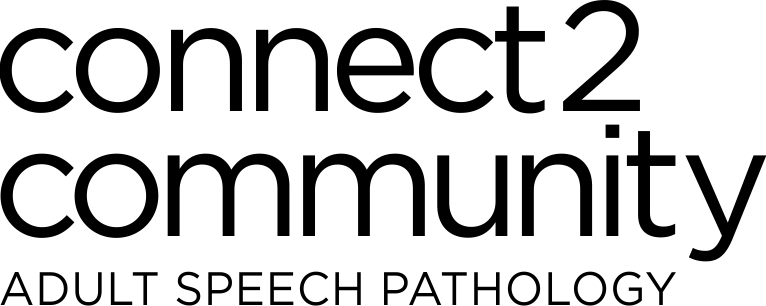

Acquired NEUROLOGICAL Communication DisorderS
APHASIA
What is Aphasia? (a – faze –yuh)
Aphasia is a communication disorder caused by damage to the language areas of the brain. In most people, the left side of the brain controls language functions such as speaking, reading, writing, and understanding language. Aphasia can impact a person’s ability to talk, understand what is being said to them, and the ability to read and write.
People with aphasia may have difficulty:
- Speaking (expressive aphasia)
- Understanding what other people are saying (receptive aphasia)
- Reading (aloud or silently)
- Spelling
- Writing (and typing)
- Understanding and using numbers (such as telling the time, dealing with money).
- Using gestures.
What causes aphasia?
- Stroke (most common cause of aphasia)
- Brain tumour
- Brain infection
- Brain Injury (car accidents and falls)
- Primary Progressive Aphasia
- Epilepsy
Speaking (talking)
Aphasia can affect talking in many ways. Some people with aphasia:
- Have difficulty finding the word they want to say
- Make speech errors which may involve sound omission ‘ottopus’ for octopus, sound addition ‘octropus’ for octopus, sound distortion ‘octrogut’ for octopus, sound substitution ‘octogus’ for octopus
- Make word errors (person may say ‘dog’ when they meant ‘cat’)
- Make grammatical errors (‘he sleep’ instead of ‘he is sleeping’)
- Use only a few words or short phrases
- Can speak well or fluently using long sentences but it doesn’t make sense to the listener
Understanding
Aphasia can affect understanding in many ways. Some people with aphasia have difficulty:
- Understanding the meaning of a word
- Understanding a sentence as it becomes longer and more complex
- Understanding grammatical sentences (person may not recognise a question is being asked and therefore not respond accordingly)
- Following directions and instructions of increasing length and complexity
- With following conversation, especially group conversations
- Some people with aphasia use a non-existent word or irrelevant word in their sentence, and are not aware of this error
Reading
Aphasia can affect reading in many ways. Some people with aphasia may have difficulty:
- Recognising letters in words (also numbers)
- Recognising whole words
- Understanding what they are reading
- Some people with aphasia find they are much slower at reading
- Some people with aphasia find they make visual errors when reading (person reads ‘doom’ for ‘door’)
Writing
Aphasia can affect writing in many ways. Writing errors may mirror speaking errors.
- Some people may write a word they didn’t mean to write
- Some people may not realise their writing mistakes
- There may be mistakes with spelling and grammar
- It may be hard to write a letter or letters of the alphabet
It’s important to be aware of the following
- Aphasia affects every person differently.
- Aphasia does not impact a person’s intelligence.
- People with aphasia have thoughts and opinions that need to be shared, and emotions that need to be heard.
- People with aphasia know what they want to say but can have difficulties getting their message across.
- Aphasia can co-exist with dysarthria or apraxia of speech.
- Aphasia can co-occur with memory and attention deficits.
- Even a mild aphasia can have a significant impact on participation and perceptions of identity.
How can speech pathology help?
- Identify a holistic profile of a client’s communication needs and ability
- Collaborate with client and family members towards person-centered therapy goals
- Discuss therapy options specific to the client’s communication needs and goals
- Provide treatments that meets the client’s communication needs and goals. All treatments focus on real-life, meaningful situations and tasks to enhance success in communication for the person with aphasia and their family/friends.
- Provide compensatory approaches in the form of Augmentative and Alternative Communication (AAC) to increase environmental support and reduce communication barriers.
- Provide communication partner training and support for the individual with aphasia and their close communication partner/s. Knowledge and use of facilitative strategies by communication partners can enhance successful conversation.
- Identify barriers and facilitators within the person’s communication environment, with the goal being – how to best support communication for the person with aphasia within their community.
- Provide aphasia specific education for clients and family
Speech pathologists are trained to assess, diagnose, provide treatment, and advocate for people with aphasia and their families. Please contact connect2community speech pathology if you have any concerns or questions regarding aphasia or a recent diagnosis of aphasia.
PHONE 0411 864 386
EMAIL info@connect2community.au
